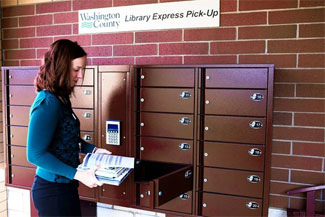New Library Technologies Dispense With Librarians
Daily News Article — Posted on March 7, 2011
(by Conor Dougherty, The Wall Street Journal, WSJ.com) HUGO, Minn. – In this suburb of St. Paul, the new library branch has no librarians, no card catalog and no comfortable chairs in which to curl up and read.
 Instead, the Library Express is a stack of metal lockers outside city hall. When patrons want a book or DVD, they order it online and pick it up from a digitally locked, glove-compartment- sized cubby a few days later. It’s a library as conceived by the Amazon.com generation. [PHOTO AT RIGHT: A library worker shows how to check out books from a digitally locked cubby, in Hugo, Minn.]
Instead, the Library Express is a stack of metal lockers outside city hall. When patrons want a book or DVD, they order it online and pick it up from a digitally locked, glove-compartment- sized cubby a few days later. It’s a library as conceived by the Amazon.com generation. [PHOTO AT RIGHT: A library worker shows how to check out books from a digitally locked cubby, in Hugo, Minn.]
Faced with layoffs and budget cuts, or simply looking for ways to expand their reach, libraries around the country are replacing traditional, full-service institutions with devices and approaches that may be redefining what it means to have a library.
Later this year Mesa, Ariz., plans to open a new “express” library in a strip-mall, open three days a week, with outdoor kiosks to dispense books and DVDs at all hours of the day. Palm Harbor, Fla., meanwhile, has offset the impact of reduced hours by installing glass-front vending machines that dispense DVDs and popular books.
The wave of innovation is aided by companies that have created new machines designed to help libraries save on labor. For instance, Evanced Solutions, an Indianapolis company that makes library software, this month is starting test trials of a new vending machine it plans to start selling early next year.
“It’s real, and the book lockers are great,” said Audra Caplan, president of the Public Library Association. “Many of us are having to reduce hours as government budgets get cut, and this enables people to get to us after hours.”
Some library directors worry that such machines are the first step toward a future in which the physical library-along with its reference staffs and children’s programs-fades from existence. James Lund, director of the Red Wing Public Library in Red Wing, Minn., recently wrote skeptically about the “vending library” in Library Journal, a trade publication.
“The basis of the vending machine is to reduce the library to a public-book locker,” Mr. Lund said in an interview. “Our real mission is public education and public education can’t be done from a vending machine. It takes educators, it takes people, it takes interaction.”
Public libraries are an American creation. The first was introduced by Benjamin Franklin, who created a co-operative library funded by people who used it. The first tax-supported library was founded in Peterborough, N.H., in 1833, according to Larry Nix, a retired librarian and library historian. Today there are about 16,700 public library buildings in the country.
Robo-libraries are still a relatively rare sight. Public Information Kiosk Inc., a company in Germantown, Md. that sells kiosks and vending machines to libraries, has had 25 orders for a book-and-DVD-dispensing machine that the company introduced last year. Fred Goodman, the company’s chief executive, estimated that, overall, there are no more than a few dozen vending machines now in operation. Still, he expects to sell at least twice as many units in 2011.
Hugo is a town of 13,700 people on the northern fringes of the Minneapolis-St. Paul metropolitan area that has seen its population double in the last decade. But surrounding Washington County is struggling to build the infrastructure to support the newcomers: Over the past year, the county’s nine-branch library system has cut the equivalent of two full-time workers to trim costs.
And yet, the system is popular: Visits last year rose 10% compared to 2007.
The combination of greater demand and leaner resources is visible in the wait list for some popular books. The system has 32 copies of “Freedom,” the new Jonathan Franzen novel set in nearby St. Paul, but 321 people on the waiting list-a 10 to 1 ratio. In flusher times, the wait-list ratio was usually closer to 5 to 1 for popular titles.
The 20 lockers of Library Express won’t solve that problem, but they have made the library more convenient. The county is adding 20 more lockers next month.
Melody Baker, 47, recently used the lockers to check out the best seller “Eat, Pray, Love,”-“I had to see what the fuss was about,” she said.
The library’s main branch is five miles from her house, but Ms. Baker, who is a personal care attendant for an autistic child, says it’s hard to get there during business hours when the library is open. “It’s difficult for me to get up there,” she said of the library’s main branch. “This makes it much easier to get library material.”
NOTE: This article was first published at wsj.com on October 25, 2010.
Copyright 2011 Dow Jones & Company, Inc. All Rights Reserved. Reprinted here for educational purposes only. Visit the website at wsj.com.
